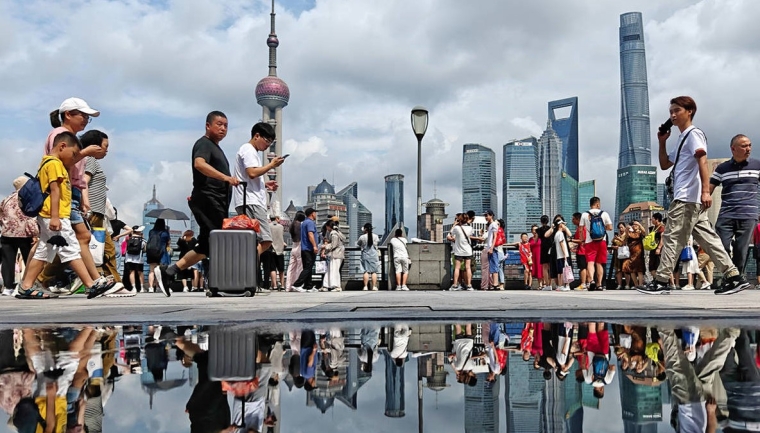
On a recent trip to China with my Northwestern Kellogg students, we were all struck by how few Americans had returned to the country since the end of its zero-COVID policy in December 2022.
In Shanghai, our tour guide had hosted only one other US school group, and she expected to have only one more this year – a marked decline from the 30-plus she booked each year prior to the pandemic. In Guilin, where the iconic mountains, a UNESCO World Heritage site, had previously been among the most visited places on Earth, we were allegedly the first American group to visit since the beginning of 2020. Only two more are expected this year. One hopes these are low estimates and that more have and will come. But there is no denying that the number of Americans traveling to China, which plummeted during the pandemic, has been slow to recover.
This sharp decline comes at a time when US-China relations have reached their lowest point since President Richard Nixon visited Chairman Mao Zedong in 1972. The public discourse in both countries has become almost exclusively about zero-sum competition, if not outright hostility. While US politicians and commentators from across the political spectrum portray China as the economic and geopolitical threat, Chinese media insist that American democracy is false and that the US is unfairly containing China’s growth and development.
With most of the news coverage in both countries focused on macroeconomic and geopolitical issues, little attention is paid to the lives and perspectives of ordinary people. Opportunities to generate empathy are scarce, and the results are increasingly apparent. In US opinion polls, only 15% of respondents viewed China favourably in 2023, down from 53% in 2018, and from 72% in 1989.
Some concerns are well-founded. In 2018, Americans and Canadians were shaken by China’s three-year-long detention of two Canadian NGO workers in retaliation for the relatively mild house arrest of Meng Wanzhou, a Huawei executive who had been charged with helping her company evade sanctions on Iran. Then came China’s pandemic lockdowns, which prompted most Americans to leave the country.
While completely understandable, the mass exodus of Americans and other expatriates has further curtailed the flow of information and in-person exchanges between the two countries’ business and NGO sectors. Add the fact that Western journalists’ activities are extremely restricted in China, and it is easy to see why the country feels so foreign and opaque to many outsiders. The exciting economic opportunities and fun travel stories of just a few years ago have given way to angst and uncertainty.
But has China changed fundamentally since 2019? Do Chinese people no longer believe in the potential of markets? Do they hate Americans?
My class saw as much of the country as possible in the space of just two weeks. We visited three cities and saw many Chinese and American companies – some thriving, others fighting for survival. Students also dashed around cities and suburbs on their own to conduct independent projects.
On our last day, when I asked them what stood out the most, perspectives varied. Some were impressed by China’s transportation infrastructure and cleanliness, and by the sophistication of its economy. Others remarked on the apparent poverty amid the glamor and glitz of Shanghai and Hong Kong, and many noted the constant presence of government surveillance. But all had been pleasantly surprised by their in-person encounters and meetings with Chinese people from all walks of life – from people on the street to heirs of billion-dollar family businesses. They found the Chinese people to be warm and even humble.
Students who had been wary or suspicious were heartened by the experience. One had previously helped draft anti-China legislation when she worked in government, and another had experienced an intense US-China standoff in the South China Sea. A US Department of State travel advisory had left many students worried, but they wanted to know more about the country beyond what they had read in the headlines.
The joy and sense of relief were mutual. Chinese children and their parents giggled when one of my students picked up a toddler and tossed him in the air. Women selling bowls of noodles for six renminbi (less than a dollar) made sure that students who could not read Chinese received the same discounts offered to Chinese customers. Everywhere we went, people told me that my students were a breath of fresh air – just as fun and open as they remembered Americans to be. They laughed with them, took pictures, and delighted in showcasing their work to them. They had missed these Americans. After years of isolation and negative press, they had grown worried that Americans had changed.
Of course, not all Chinese and Americans would get along, and the trip did not suddenly transform my students into China super-fans. But it did help them appreciate the complexity of the world’s second-most-populous country. They saw first-hand that the Chinese people – almost entirely absent from US news coverage – are not the same as the Chinese government or what US news headlines might suggest.
The US and China must work through many differences, which will not happen overnight. In the meantime, it is crucial that we preserve in-person interactions. Chinese and Americans must not lose sight of their common humanity. The greater the tension between their governments, the more important this becomes.
Nancy Qian, Professor of Managerial Economics and Decision Sciences at Northwestern University’s Kellogg School of Management, is a co-director of Northwestern University’s Global Poverty Research Lab and the Founding Director of China Econ Lab. Copyright: Project Syndicate, 2024, published here with permission.
6 Comments
Except we are not in America, We are in NZ. Where 7th generation Chinese ethnicity New Zealanders live and the connection to China is still very strong. We have regular trips of NZders back and forth between China as they are our main trading partner and a significant percentage of the population still have relatives there. We are closer to China then we are to America so this article is very very odd. It is far more unusual to see an American then a Chinese born visitor. We have more Chinese culture taught, and practiced here and the investment movements of China matter far more to us then America & American culture. Sure the main language in NZ is English but that is vastly different to American English (predominantly only used for coding and for understanding the global movie & games output of the largest entertainment media companies).
This article is not appropriate for NZ audiences as we are also in much the same position as China, hoping American tourists come back but seeing the likelihood they will only do so in less numbers. We have far more Chinese tourists here and much of the NZ media has Chinese localization or a NZ Chinese equivalent (see Chinese NZ real estate sites). We also share more similar policies with China then we do with America and certainly our rights for different social groups are far more similar to China's then America's treatment of certain social groups. However that being the case we are more liberal and democratic then China so our system of government while vastly different to America is not far off a 2 party system. Our court system and structure is also different to both those countries as well.
Given that why is the opinion of Chinese locals about Americans and vice versa important to us here in NZ? It matters little what the two groups think of each other's people as tourists unless with some national insult global shipping movements get affected. In case you did not realize we are vastly ethnically different to Americans and their trade with us matters far less then China and the wellbeing of those ethnically Chinese in NZ. We would not even limit trade even with the active slavery and genocide in China right now. We just happily continue with our most valued global partner. Chinese families helped make NZ what it is today and Americans are complete strangers to NZ. Fewer Americans immigrate here then Chinese so we are not going to suddenly have more on the ground ties with America amongst the populace in the next few generations either.
If China pushed for active censorship of certain topics in NZ, most NZ media bends over for them to make it happen. If anything the only country that is closer to us then China is Australia but that is only because of proximity and by now so much of the NZ population (of all ethnicities) have gone across the ditch. So that we need strong partnership and support structures for both NZ and Aus citizens between the two countries because so many families are split across them and Aus supply us so much food.
You want to humanize the Chinese relationship start by humanizing Chinese political activists, and Uyghur populations. All humans deserve equitable human rights and treatment no matter what country they are in at the time.
In contrast to you, I see this is informative. That ordinary Americans are, for whatever reason, not in person visiting China, observing directly this complex and beautiful and safe country is a worry for this kiwi.
why?
because misunderstandings can lead to conflict. More guns, less butter as per my economics 101.
when elephants roll in the grass, (USA and China) it is the ants (nz) that get squashed.
China does not accept immigration, like many Southeast Asian countries, they renounce multiculturalism in favour of perceived racial purity. That's why you don't see many foreigners in China.
China is multicultural. Without a doubt, It's not one big homogenous tribe.
True, but they are working hard to fix that.
China does not accept huge immigration mostly because they don't need it. their population is so large that became a problem. Things may change down the track when they have too many seniors, but not yet changed.
and China is multicultural, even within China. it is not a country of one ethinic group like Japan, it consists multiple groups of peoples.

We welcome your comments below. If you are not already registered, please register to comment
Remember we welcome robust, respectful and insightful debate. We don't welcome abusive or defamatory comments and will de-register those repeatedly making such comments. Our current comment policy is here.